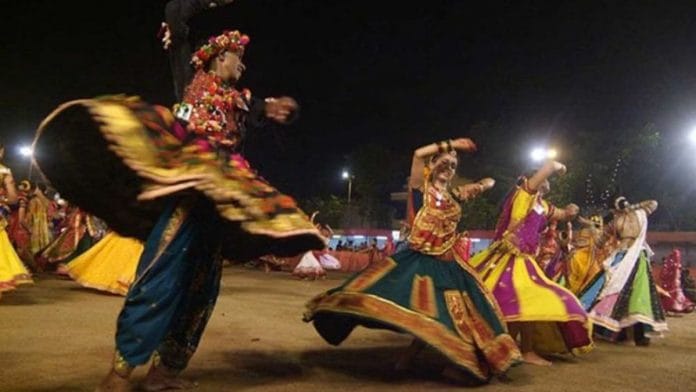Growing up as a Pasmanda Muslim in India, some of my most cherished memories are of celebrating festivals with people of other faiths. Those moments weren’t just about food or rituals; they were about belonging together. They were living testimony to the idea of India I hold close—a place where diversity is lived and shared in the most ordinary, joyful ways.
Garba during Navratri was one of the Hindu festivals I grew up genuinely enjoying. Many Muslims around me carried the same spirit—seeing it as a way to share joy, culture, and community. But not everyone viewed it that way. Some Muslims, including Islamic scholars, looked at garba through a narrow, rigid lens. For them, it was a ritual tied to Hindu deities, something they warned against as shirk—forbidden in Islam. Others objected to the mingling of men and women, calling it immodest. I never agreed with that thinking. To me, it was simply part of the larger Indian life we all lived. Yet today, there seems to be a new, unexpected reason why Muslims might hesitate to step into garba—not because of religion, but politics.
Muslim leaders are now advising young people to stay away from garba— to “avoid harassment” and “maintain peace.” This follows comments from Hindu organisations and BJP spokespersons like Keshav Upadhye, who openly suggested Muslims should not take part in “Raas Garba.” In Surat, Bajrang Dal and VHP members even stormed into a garba event, objecting to the presence of three Muslim drummers from a Mumbai-based band.
Festivals as battle lines
On the surface, it may seem like religious leaders are acting responsibly by urging youth to step back and prevent conflict. But let’s be honest: for some, this is a dream come true. Regressive forces never wanted Muslims to mingle or celebrate festivals of other religions. What they could not enforce through religious conservatism, the politicisation of garba is now achieving.
The irony is stark. Conservative clerics have always warned against Muslims joining in festivals like garba, framing it as religiously impermissible. Now, Hindu right-wing groups say Muslims should be excluded, treating their very presence as provocation. Different reasons, same outcome. Caught in the middle are ordinary young Muslims who may simply want to celebrate, enjoy music, or dance without the burden of carrying the weight of their community’s identity.
What we are seeing is a convergence: religious dogma and political opportunism, often at odds with each other, suddenly finding common ground. Both thrive on segregation and benefit when communities don’t interact, when suspicion replaces shared spaces of joy. For the cleric, it is about preserving the notion of purity. For the politician, consolidating power through fear. For both, the cost is the same, choking the idea of India as a place where identities overlap, where festivals are bridges, not battle lines.
Also read: ‘Sabka Saath’ or ‘Paaijaan’? Assam BJP’s anti-Muslim video contradicts PM Modi’s message
Those who oppose Muslim participation in garba now argue that it’s a “Hindu festival” and that Muslims should be allowed at all. Some argue that since the Quran forbids idol worship, Muslims have no business being there. A few even go as far as to suggest that if Muslims really want to take part, they should first convert. But these arguments are nothing more than excuses dressed up as principles. When the goal is segregation, there will always be a convenient reason to justify it.
I cannot count how many Hindu friends I have seen celebrating Eid, joining the feast on Bakrid, or even walking alongside during Muharram processions. Imagine the same arguments applied there—it would be absurd. Festivals in India have always thrived on openness—an unspoken understanding that joy multiplies when shared. To now demand purity tests for who can join and who cannot is not about religion; it is about shrinking the very idea of community into closed boxes where fear and mistrust rule.
And really, what does any community gain by restricting its festivals only to itself? Does joy multiply when fewer people share it? Does culture grow stronger by building walls around it? The truth is, no festival has ever become less auspicious because outsiders joined in—it has only become richer, louder, and more alive.
In the end, both sides, the religious hardliners and the political opportunists, are working toward the same goal: keeping communities apart. Every time a festival becomes smaller, more exclusive, more fearful, we lose a piece of the India that once believed joy was meant to be shared. And if we don’t resist this shrinking of our spaces, we may wake up one day to find there is no common ground left at all.
Amana Begam Ansari is a columnist, writer, and TV news panellist. She runs a weekly YouTube show called ‘India This Week by Amana and Khalid’. She tweets @Amana_Ansari. Views are personal.
(Edited by Ratan Priya)







Dear Ms. Amana, This is the 2 nation theory at work. It is bunkum but you can believe it and claim that Hindus and Muslims are different.
The conservative elements and todays hardline politics will always separate people of different communities. It is for us, the common people to keep building bridges and build lives and communities together. I believe that there will always be common ground and secularism is a way of life because people are inherently heterogenous.